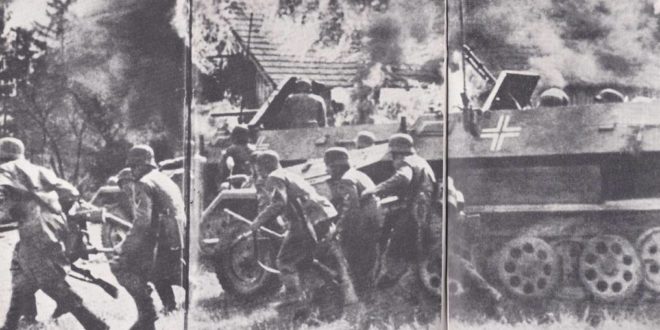Now the people of Europe began to hear a new sound, a sound that would haunt them throughout the years of war — the wail and shriek of air-raid sirens. At night, the lights of Europe went out and the “blackout” made familiar streets strange places of darkness. Street lamps were left unlit and windows were covered with heavy draperies. Any stray gleam of light might help guide enemy bombers to their targets.
Hurrying about their wartime duties, the people of Britain and France began to wonder. They had not wanted war and yet war had come. Why? What had happened? It seemed mysterious and impossible to understand, but as they thought about it, certain things became clear. Some of the problems that led to World War II were left-overs from World War I. Germany and Italy had remained “have-not” nations. They needed more territory for raw materials and more markets for their goods. The Germans felt that the Versailles Treaty was humiliating, unjust and the Allies had done nothing to change it. The League of Nations, especially without the participation of the United States, had been weak and had not carried out its promise of real disarmament. The United States had not wanted to get involved in Europe’s problems and had followed a policy of “isolation.”
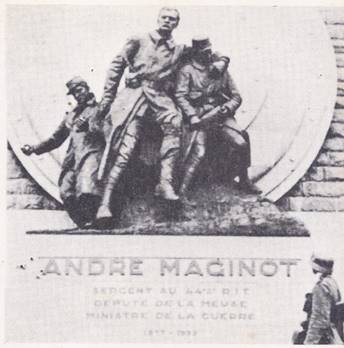
These were some of the causes of the war; there were others as well. France had suffered greatly in World War I and was afraid of being drawn into another conflict. Her generals had hesitated to send troops against Hitler at a time when it was still possible to stop him and then there was the distrust of the Soviet Union and Communism. Many French and British statesmen, such as Chamberlain, had believed that Fascism would protect Europe against Communism. Unlike Churchill, they had been blind to the danger of Fascism itself and had given Hitler everything he wanted. The Soviet Union, on the other hand, had been treated like an outsider. Its offers of aid had been turned down and it had not even been consulted on Czechoslovakia. In the end, Hitler and Stalin had turned the tables by signing their non-aggression pact and Germany had attacked Poland.
The people of Poland had little time to wonder about the causes of the war. They were too busy fighting and trying to save their lives from the enemy. Panzer units — mechanized units of the German army — struck deep into Polish territory. Motorcycle infantry, tanks, armored cars and trucks carrying artillery cut the slower-moving Polish forces to pieces. Fighter planes blasted them with machine-gun fire. Bombers dropped their deadly cargo everywhere — on troop installations, on roads, on bridges, on factories, on homes. It was a new kind of warfare. Blitzkrieg, the Germans called it — lightning war. Indeed, the Nazis seemed to move with the speed and power of lightning. By September 16, they had all but surrounded Warsaw.
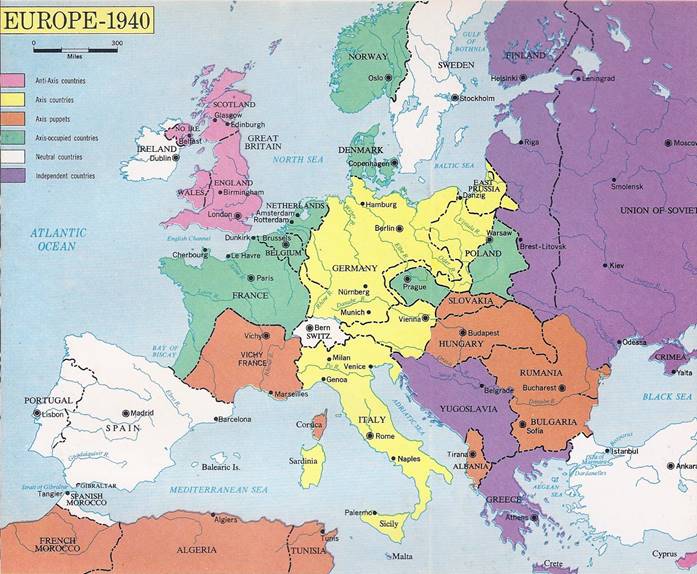
The next day, the Russians sprang another surprise. Russian armies marched into Poland across the eastern border. In spite of bombardment, the Poles still held out in Warsaw, but on September 27 they were forced to surrender. In only twenty-seven days a country of thirty-four million persons had been completely defeated.
On September 29, the Germans and Russians signed a treaty dividing Poland between them. The Russians claimed they had moved against Poland to protect their own frontiers. It was true that they had blocked off Hitler from important oil fields in Galicia, but the conquered Poles found it difficult to see any difference between an occupying army of Russian Communists and one of German Nazis.
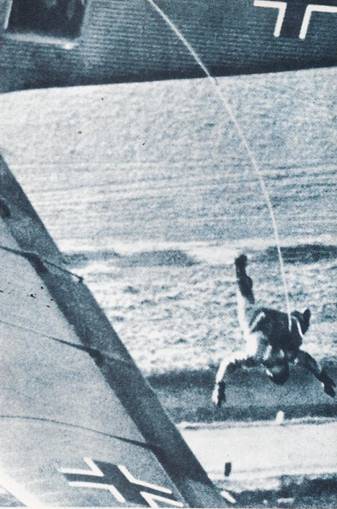
In a world at war, the Russians were determined to improve their military position. In September and October, they forced the tiny countries of Estonia, Latvia and Lithuania to sign treaties allowing Russia to establish military bases on their territory. Within less than a year, these countries would become absorbed by Russia. The Russians also demanded certain territories from neighbouring Finland. When the Finns refused to give in, the Russians accused the little country of trying to attack them. On November 28, Russian troops marched into Finland.
The Finns fought back. They proved stronger than anyone expected and not until March of 1940 would they be forced into signing a treaty.
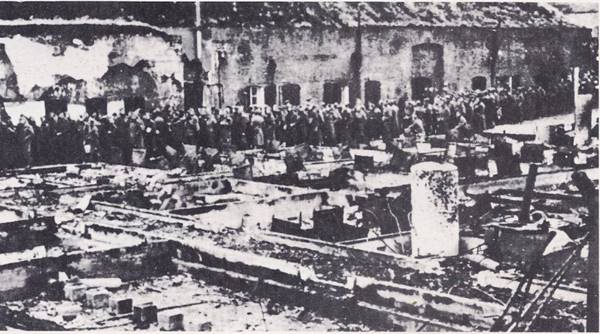
While the Russians slowly fought their way through the snows of Finland, the war in the west had taken a strange turn. The Germans seemed satisfied to remain behind their fortifications, the Siegfried Line and wait. The French seemed satisfied to remain behind their fortifications, the Maginot Line and wait. The 158,000 British soldiers who had been sent to France could also do nothing but wait. Except for the fighting at sea, there was little action. Some people called this period the time of the “phony war.” Week after week, month after month, it dragged on. On April 4, 1940, Chamberlain said that he was more confident now than he had been at the beginning of the war. He was sure that Hitler had “missed the bus.”
Once again Chamberlain turned out to be wrong. Not only had Hitler boarded the bus, he had taken the wheel and was driving along at top speed. On April 9, the Germans suddenly struck at Denmark and Norway. The Danish government decided that their small country was too weak to fight and surrendered almost at once. The Norwegians tried to resist. A British force was sent to Norway, but it was too little and arrived too late to make any difference; that phrase, “too little and too late,” would become a familiar one as the war went on. To add to the Norwegians’ difficulties, the Nazis were aided by a group of traitors led by Major Vidkun Quisling. Norway, too, was forced to surrender and the word “quisling” came to mean “traitor” everywhere in Europe. So, Hitler’s military machine rolled on, crushing everything in its path. On May 10, Germany attacked three more countries — the Netherlands, Belgium and Luxemburg. A tiny country without an army, Luxemburg fell in a day. The Dutch fought back fiercely, hoping to hold out until help arrived from France, but the Luftwaffe — the German air force — cut off the communication lines to France and dropped bombs on Dutch soldiers and civilians alike. German parachute troops and mechanized units overran the country. While negotiations were going on for the surrender of the city of Rotterdam, low-flying German bombers blasted part of the city to ruins. Hundreds of civilians were killed, thousands wounded and 78,000 were left homeless. The Germans threatened to bomb other cities and the Dutch gave in. Only a week had passed since the Germans crossed the border.
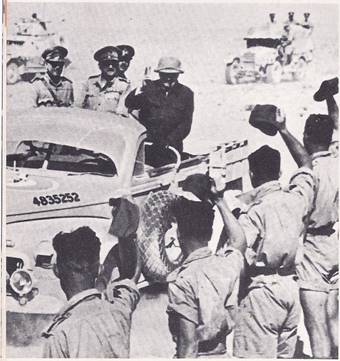
Belgium, too, fought back, with the aid of French and British forces, but the Germans had the help of “fifth columnists” traitors behind the lines. German mechanized units, with about 5000 tanks, drove quickly ahead, crossing the border into France on May 17. The French could not hold them and they went roaring down the Sommes valley to Abbeville. On May 28, the Belgians were forced to surrender.
The Germans began closing in on a large force of British and French troops‚ pushing them back to the edge of the sea at Dunkirk. Trapped on a narrow stretch of beach, with the Germans only twelve miles away, they faced death or capture. The German generals said the enemy was doomed; Hitler joyfully predicted that the entire war would be over in six weeks and then, as some of the British and French held off the German armoured units, came what would be called the “Miracle of Dunkirk.”
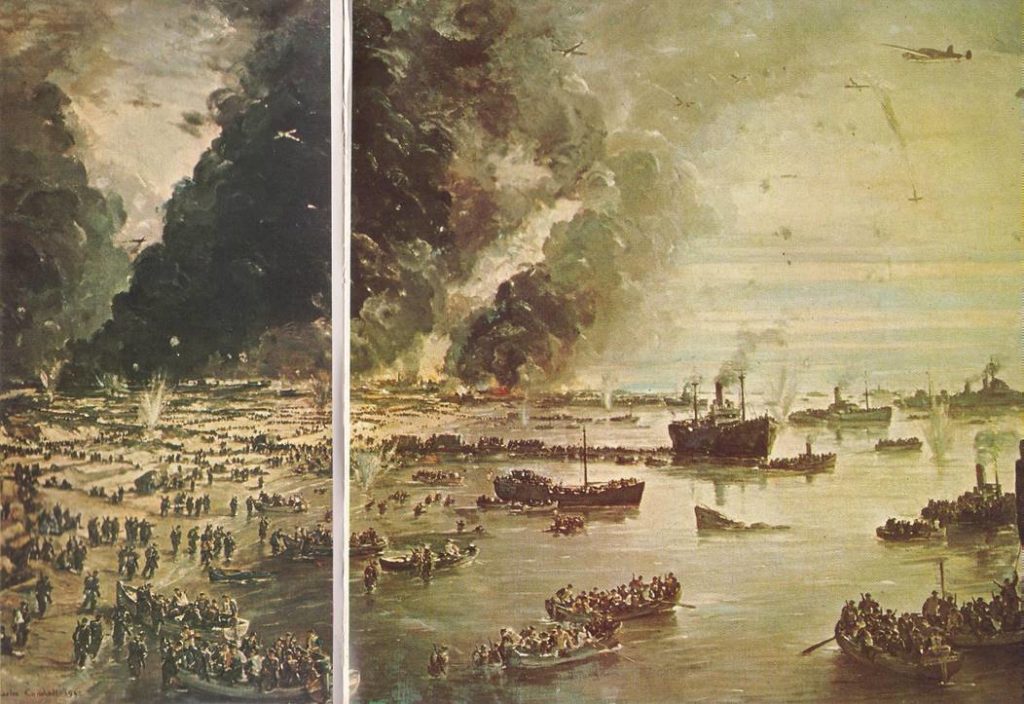
Out of the mist rising from the sea appeared one of the strangest fleets the world had ever seen — about 220 British naval vessels and 650 other assorted craft of all shapes and sizes. There were cruisers, destroyers, yachts, launches, sailboats, ferries, tugs, barges. The British had gathered together anything that could float and manned the collection with anyone who could handle a boat, including civilian volunteers. At the same time, British planes flew in to battle the German fighters and bombers.
While bombs dropped around them in the sand, the soldiers formed long lines and patiently waited their turn to be taken off. From May 30 to June 4 the vessels went to and fro, picking up soldiers and carrying them across the Channel to England. About 330,000 British and 26,000 French troops were rescued in one of the great surprises of the war.
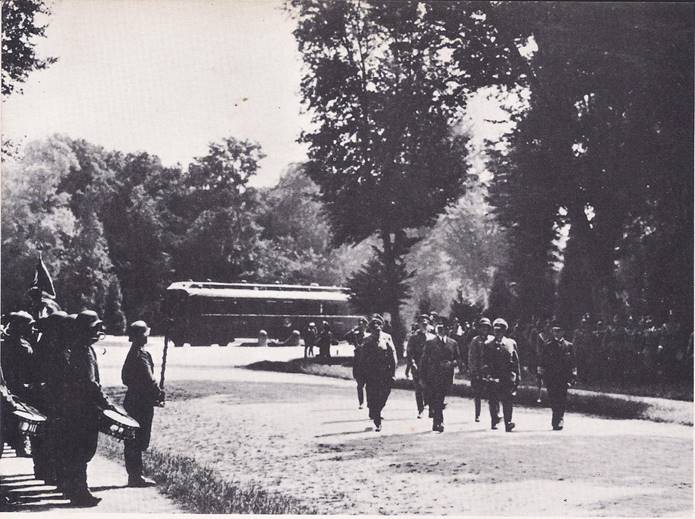
Meanwhile, Chamberlain had been forced to resign as Britain’s prime minister and had been replaced by Winston Leonard Spencer Churchill. Born in 1874, Churchill had been a soldier, a newspaper correspondent, a writer, Lord of the Admiralty in World War I and a member of the House of Commons. Short, sturdy, chunky, he resembled John Bull, the figure used by cartoonists to represent Great Britain. Before the war ended, he did indeed seem to be the very spirit of Britain. He was a magnificent speaker and writer, a courageous and forceful leader, a brave and bold man. The people of Britain soon recognized that if anyone could lead them to victory, “Winnie” was the one to do it.
Churchill had opposed the policy of appeasement and had warned of the danger of the Nazis. When he became prime minister on May 11, 1940, he well knew what a task he had taken on. Hitler had just conquered five countries in a few weeks; it seemed as though nothing could stop him from conquering the world.
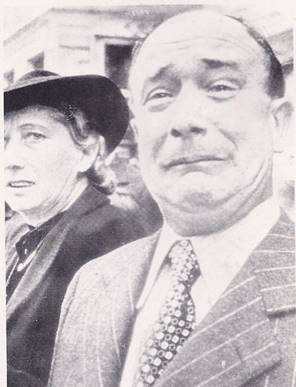
Speaking before the House of Commons on May 13, Churchill said: “I have nothing to offer but blood, toil, tears and sweat. . . . You ask, what is our policy. I will say: It is to wage war, by sea, land and air, with all our might and with all the strength that God can give us: to wage war against a monstrous tyranny never surpassed in the dark, lamentable catalogue of human crime. This is our policy. You ask, what is our aim? I answer in one word: victory — victory at all costs; victory in spite of all terror; victory, however long and hard the road may be; for without victory there is no survival.”
Churchill was proud of the rescue at Dunkirk, but, as he said, “wars are not won by evacuations.” The British had lost 30,000 men in Belgium, the French even more. German bombers at bases across the Channel were now only five or ten minutes away. Britain badly needed help and Churchill hoped he could get it from the United States.
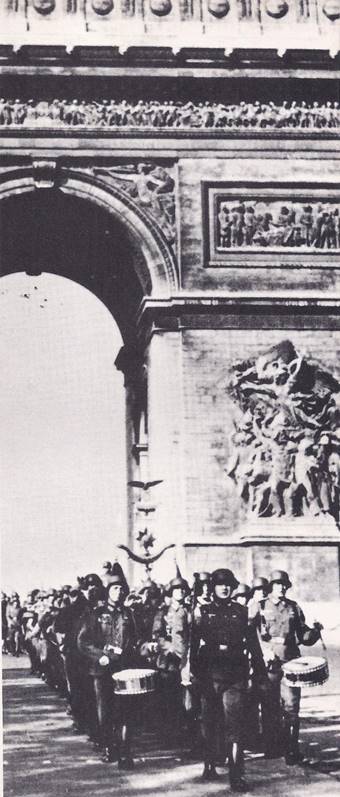
On June 4, Churchill said: “Even though large tracts of Europe and many old and famous States have fallen or may fall into the grip of the Gestapo and all the odious apparatus of Nazi rule, we shall not flag or fail. We shall go on to the end. We shall fight in France, we shall fight in the seas and oceans, we shall fight with growing confidence and growing strength in the air; we shall defend our Island, whatever the cost may be. We shall fight on the beaches, we shall fight on the landing grounds, we shall fight in the fields and in the streets, we shall fight in the hills; we shall never surrender; and even if, which I do not for a moment believe, this Island or a large part of it were subjugated and starving, then our Empire beyond the seas, armed and guarded by the British Fleet, would carry on the struggle, until, in God’s good time, the New World, with all its power and might, steps forth to the rescue and liberation of the Old.”
That same day, Churchill warned, “We must expect another blow struck almost immediately at us or the French.” He did not have long to wait to see his prediction come true; the next day Germany opened a large-scale offensive against the French. Five days later, Germany had an ally — Italy. As President Roosevelt put it, ‘The hand that held the dagger has struck it into the back of its neighbour.” Mussolini saw complete victory ahead for Germany and was anxious to pick up some of the loot. He sent his troops against the French, but they accomplished little.
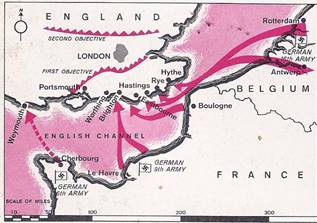
Not that Hitler needed help. The French fought bravely, but they were outnumbered not only in men, but in planes and tanks. They fell back and soon the Germans were on their way to Paris. Afraid that Paris would be bombed and destroyed, the French government declared it an open city. On June 14, without a battle, the Germans marched into Paris and the Nazi flag, with its swastika, flew from the Eiffel Tower.
Marshal Henri-Philippe Pétain, a French general, became head of the government. When Hitler received the news that Pétain was asking for an armistice, he danced a little jig. At last Germany was avenged for its defeat in World War 1 — and he, Hitler, was responsible! On June 22, Hitler was in France to sign the armistice. To add to his joy, he met with French officials in the same railway car in which the Germans had been handed the terms of surrender in 1918.
WHY THE FRENCH FAILED
Again the world wondered. Why had France, once one of the great military powers of Europe, collapsed so quickly? Again, the reasons were clear. In the years before the war, France had been weakened by the struggle between its various political groups. A number of its leading businessmen and politicians, fearing the strength of the left, had turned more and more to Fascism and were sympathetic to the Nazis. France’s generals seemed to have learned nothing since World War I. They still placed their trust in trench warfare and fortifications. They refused to listen to Colonel Charles de Gaulle and a few others who pointed out that future wars would be mechanized wars. Instead of building up their force of tanks and planes, they spent millions of francs on the Maginot Line — and even then they did not extend their fortifications far enough to guard against an invasion from Belgium.
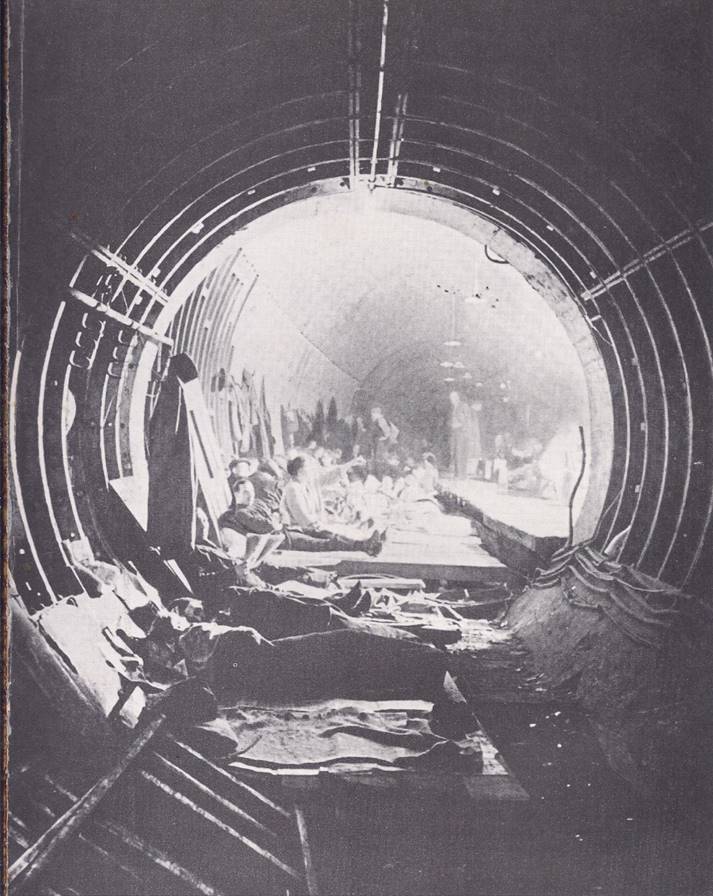
When the Nazis Struck, France had no real unity and was unprepared for war in any way. In spite of the courage of the French soldiers, the army was no match for Hitler’s war machine. So France quickly fell and its people wept while German troops triumphantly goose-stepped down the broad boulevards of Paris.
The armistice with Germany called for the disarming and demobilization of the French army. German troops were to occupy an area covering more than half of France, including all ports on the Atlantic. The rest of France would be under the French government, which moved to Vichy. Pétain was made the head of the Vichy government. The eighty-four-year-old general was a kind of French Hindenburg. Many of the men he named to his cabinet were Fascists, including Pierre Laval, who believed in “collaborating” with the Nazis. Pétain was soon given the powers of a dictator and the Third Republic of France was at an end.
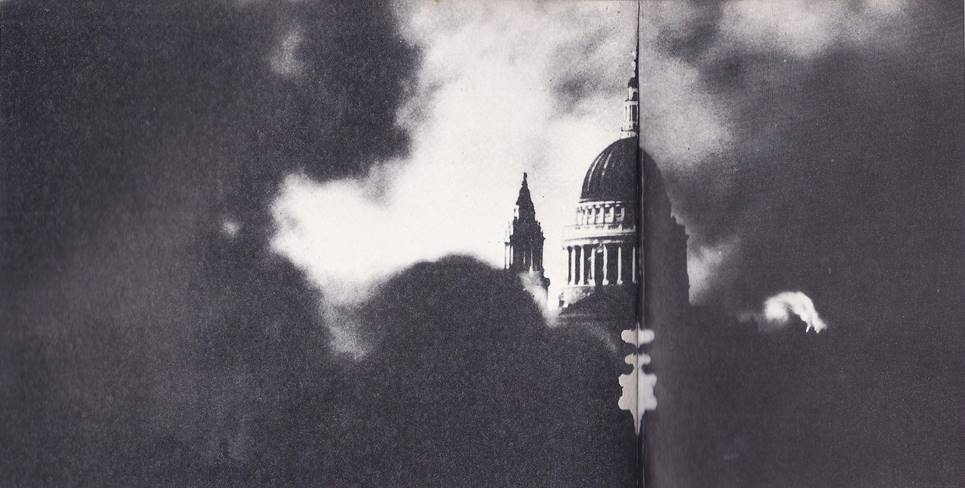
With the surrender of France, Britain faced its darkest hours. There were a few bright spots. Charles de Gaulle, who had been on a mission to England when France fell, called on all Frenchmen in the French colonies to carry on the fight. “All free Frenchmen,” he said, “should fight wherever they are.” He established the Provisional French National Committee, becoming the leader of all Frenchmen outside France. Many of the French did rally around him and in France itself people of various political beliefs banded together in an underground movement that sabotaged the Nazis.
The British captured a number of French naval vessels and later destroyed the remaining vessels at Oran, a French naval base in Algiers, to keep them out of the hands of the Germans. Supplies and arms were reaching England from the United States and President Roosevelt pledged that he would give the British all aid “short of war.” Even so, Britain now stood alone against the Germans and Churchill said, “The Battle of Britain is about to begin.”
THE BATTLE OF BRITAIN
All that separated the German forces from Britain was the English Channel, a body of water no more than twenty miles wide at some points, but invading Britain by crossing the channel was a tremendous task; no army had done it since the eleventh century. Furthermore, Hitler was not prepared for it. His victories had come too fast. He had not had time to train men for such an operation, or to build the craft he would need, or to assemble the equipment.
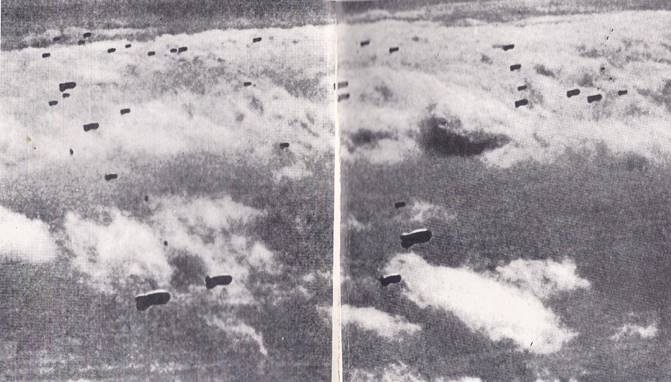
Besides, Hitler had another way in which he could attack the British. The Luftwaffe, the German air force, had more planes than Britain’s Royal Air Force. The surrender of France, Belgium, the Netherlands, Norway and Denmark gave the Germans air bases within easy striking distance of the British Isles. They could drop bombs not only on soldiers but also on civilians, not only on military installations and factories but also on homes and public buildings. Such tactics had smashed Warsaw and Rotterdam; Hitler and fat Hermann Goering, the head of the Luftwaffe, were confident that they could smash Britain as well. Within a few weeks the people would be demoralized and the government would be forced to surrender.
So it was that the Battle of Britain took place in the air. Although the Germans staged air raids as early as June, their mass attacks began in August of 1940. Day after day the air-raid sirens shrieked their warning. At night the people of London took shelter underground, jamming into the subways. In addition to explosive bombs, the Germans used incendiary bombs — as many as 70,000 in one night — that sent flames leaping high against the dark sky. They also dropped delayed action bombs, timed to go off hours or days later. They struck mostly at London, but they also raided other cities, among them Coventry, Liverpool, Birmingham and Bristol.
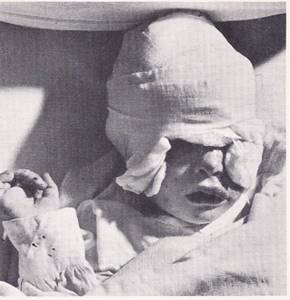
The British fought back. They fought with barrage balloons and anti-aircraft guns. They fought with rescue squads that pulled people from the wreckage, with firewatching squads that put out fires‚ with demolition squads that dismantled delayed action bombs. Above all, they fought with the Royal Air Force.
Although they were badly outnumbered, the young pilots of the RAF, flying Hurricanes and Spitfires, brought down hundreds of German planes. They struck back at Germany itself, bombing factories, power stations and oil refineries. They even raided the city of Berlin and the Germans, too, grew to know the terror that came from the sky — the terror they had not hesitated to use against others but which they had believed they would never feel themselves.
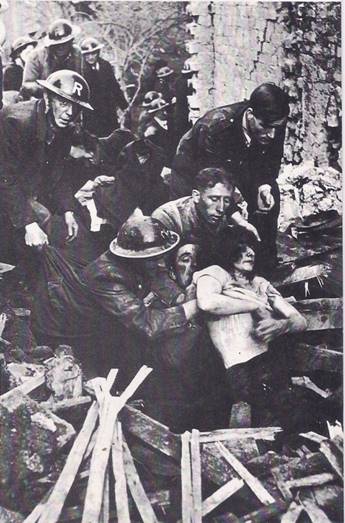
During the eighty-four days of the Battle of Britain, more than 14,000 civilians were killed and more than 20,000 injured. Thousands of homes were destroyed, as well as public buildings, factories and docks, but the British people were not demoralized. In fact, the air raids only strengthened their determination to fight on against the Nazis. The Germans had lost about 2000 planes — too many for them to continue their mass air raids. The British had won the Battle of Britain and speaking of the young pilots of the RAF, Churchill said, “Never in the field of human conflict has so much been owed by so many to so few.”
There was more bad news for Germany. In March of 1941 the United States answered Churchill’s plea for war materials by passing the Lend-Lease Act. It allowed the President to furnish supplies to “the government of any country whose defense the President deems vital to the defense of the United States.” As President Franklin D. Roosevelt put it, the United States would become the “arsenal of democracy.”
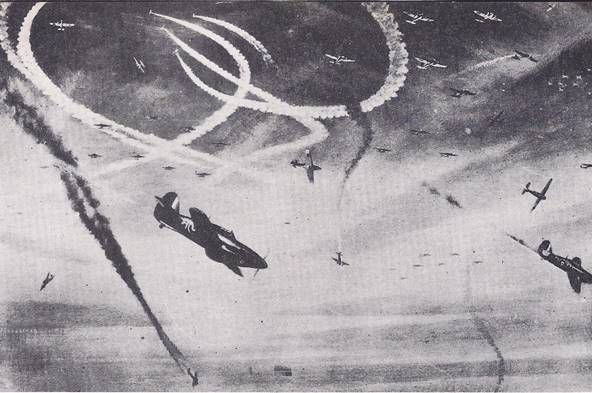
To stop the flow of arms, munitions and other supplies from the United States to Britain, German submarines and planes attacked British ships. They were so successful that Churchill again called for aid. The United States turned over hundreds of ships to Britain and convoys — groups of ships protected by naval vessels — steamed across the ocean. While the Battle of Britain was being fought in the air, the Battle of the Atlantic began on the high seas.
The war was also spreading to North Africa and the Balkans. It was Mussolini who attacked in Africa. He hoped to take the Suez Canal and win himself huge new territories, but the Italians lost almost all of Libya to the British and Mussolini was forced to call on Hitler for help. German troops went into action, under the command of General Erwin Rommel, the “Desert Fox.” They pushed the British back from Libya into Egypt and were soon in position to threaten the Suez Canal.
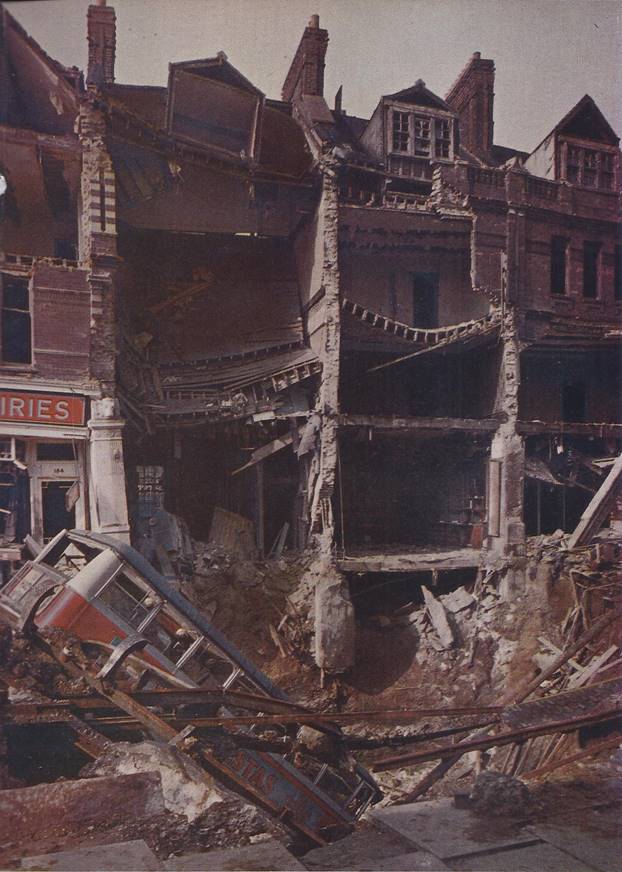
In the Balkans, Hitler had no need to fight Bulgaria and Rumania; he won control of the two countries by diplomatic means. The Greeks and the Yugoslavs however, did not give in so easily. Mussolini invaded Greece; again he was stopped and again he called for help. The power of the German army was too much for the Greeks and the British forces sent to their aid and Greece fell in April of 1941.
Some of the Yugoslav leaders were willing to come to terms with Hitler, but the people rose up against them. Enraged, Hitler sent bombers and strong mechanized units against the people who dared to oppose him and Yugoslavia, too, fell in April. Hitler then attacked Crete, the Greek island which was occupied by British troops. After terrific bombings, Hitler staged an air-borne invasion — the first in history — using planes, parachutes and gliders to land men and supplies. The British fought back hard, but in the end they were forced out.

By the spring of 1941, Hitler ruled a vast empire. Austria, Poland, Denmark, Norway, Belgium, the Netherlands, Czechoslovakia, Hungary, Rumania, Yugoslavia, Greece – all were in his hands. Germany’s traditional enemy, France, had fallen; more than half the country was directly under German control, while the rest was under a government sympathetic to the Nazis. Mussolini was Hitler’s ally. The United States had not yet committed itself to waging war. Hitler’s troops were pressing forward in Africa. He had planes to patrol the air and submarines to patrol the seas. Only Britain still challenged him and how could it go on resisting the Nazi might? Nothing could save Britain, his generals said and now was the time to launch an all-out attack.
Hitler had other plans. He had long made it clear that he considered the Slavic peoples fit only to be slaves for the master-race. He had already conquered the smaller Slavic nations; now it was time to strike at the heartland of the Slavs, at Russia itself. He had always meant to conquer Russia. Besides, he did not like having Stalin at his back and he needed Russia’s wheat and oil. Britain could wait. He would attack Russia.
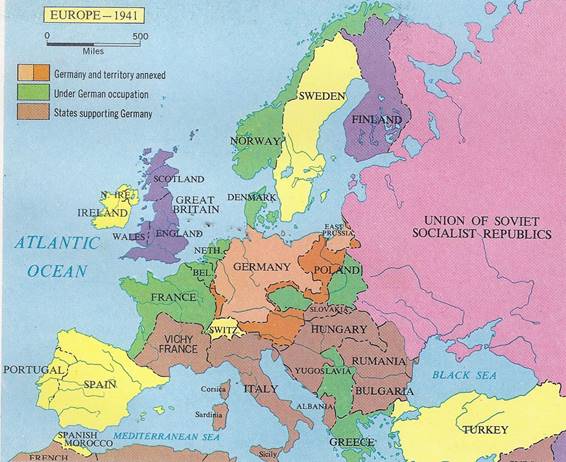
Some of his generals tried to warn him. Smashing Yugoslavia had used up precious time. If their armies did not advance quickly against Russia, they might be forced to fight through the winter — the terrible Russian winter that had beaten down Napoleon in 1812. Hitler refused to listen. His mind was made up. On June 22 — the same day on which Napoleon had begun his campaign — German soldiers crossed the Russian border.
THE INVASION OF RUSSIA
Stalin had feared war. To protect himself in the west, he had taken over territory in Poland and the Baltic states. To protect the city of Leningrad, he had taken territory from Finland. Yet, when British diplomats tried to tell him that Hitler planned to turn against him, he paid no attention. He was taken by surprise and his armies were not fully prepared. The Nazi war machine, soon aided by troops from Hungary, Bulgaria, Romania and Finland, rolled into Russia over a front more than a thousand miles long. Hitler proclaimed to his people that the attack on Russia would be “in its extent and magnitude the greatest that the world has seen,” and he proved to be right. The Russians fought stubbornly, but they were forced to retreat.
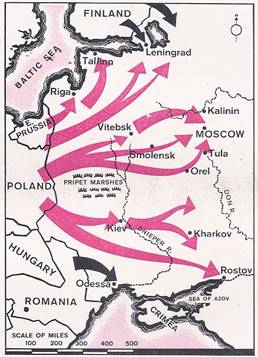
Few military experts thought that Russia’s Red Army could stand up to such an attack. In a few weeks, or possibly a few months, it would all be over. Germany would overrun Russia as it had Poland, the Netherlands and Yugoslavia, but Russia did not stand alone. Churchill had always been a foe of Communism‚ but he would have welcomed the devil himself if the devil had been willing to fight Hitler.
“No one,” Churchill said, “has been a more consistent opponent of Communism than I have for the last twenty-five years. . . I will unsay no word that I have spoken about it. But all this fades away before the spectacle which is now unfolding. . . . Any man or state who fights on against Nazidom will have our aid. Any man or state who marches with Hitler is our foe. . . . That is our policy and that is our declaration. It follows therefore that we shall give whatever help we can to Russia and the Russian people. We shall appeal to all our friends and allies in every part of the world to take the same course and pursue it, as we shall, faithfully and steadfastly to the end. . .”
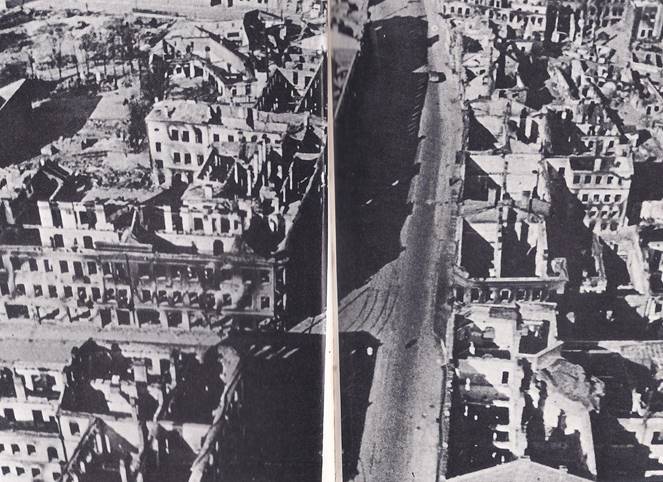
Britain and Russia became allies. Supplies began to reach Russia, from the United States as well as from Britain. At first they came slowly, but before the end of the war they would be coming in a steady stream.
Meanwhile, the Germans kept advancing. In the north, they besieged Leningrad and on the central front they pushed closer and closer to Moscow. On October 3, Hitler said that Russia “is already broken and will never rise again.” On October 17, the Russian government left Moscow, moving the capital to Kuibyshev, 500 miles to the east. In the five months since the attack began, the Germans had won more than 600,000 square miles of the Russian land and on November 16 Hitler ordered a great drive on Moscow.
Russia was not broken and neither Leningrad nor Moscow fell. On December 8, Hitler admitted that “the German army does not expect to take Moscow this winter.” He admitted, too, that German losses had been high. At least a million men had been killed, wounded, or reported missing and huge quantities of equipment, such as tanks and planes, had been destroyed.
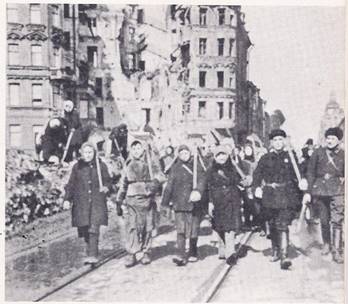
Nor were the Germans able to pick up supplies in Russia. Acting on Stalin’s orders, the Russians were carrying out a “scorched earth” policy, burning and destroying everything they could not save as they retreated. Factory equipment was moved hundreds of miles to the east, where it was again put into operation, turning out supplies for the Russians. The Germans captured fields of burnt grain, ruined factories and empty warehouses.
The Russians had other surprises for Hitler and for the world. While it was true that they had not been prepared to meet Hitler’s attack when it came, they had long been preparing for war. They had more and better guns, tanks and planes than anyone expected. Just as unexpected was the spirit of the people, both soldiers and civilians. They formed guerilla groups behind the German lines, striking quickly and then fading back into the forest. Young girls picked up rifles and sniped at the Nazis and old men and women dug trenches at the approaches to Moscow.
Then came the winter, the Russian winter, with its deep snows and killing cold. Now it was the Germans who were unprepared, for Hitler had been sure of a quick victory and he had no heavy clothing for his men. The Russians, on the other hand, had warm clothing, as well as white garments that made them invisible against the snow. Some of them had had training for winter fighting and they had special equipment, such as armoured sleds.
The Russians went on the attack and drove the Germans from a number of positions. While they regained only a small part of the territory they had lost, they showed, for the first time since the war started, that the mighty German army could be stopped. The German people were shocked and they felt no better when they read in their leading newspaper that “the toughness and staying power of the Soviet soldiers are almost beyond belief.”
That same month, the world was shaken by news of an attack in a land far from the snows of Russia. Japan’s aggressive moves in the East had caused difficulties with the United States and several Japanese diplomats had come to Washington to negotiate with American officials. By Sunday, December 7, 1941, the negotiations had produced no results, but they were still going on. Americans were reading about them in their newspapers, when they were startled by the news flash on the radio: “At 7:55 this morning Japanese planes attacked the United States naval base at Pearl Harbour in Hawaii. . . .”
Suddenly, with no warning, with no declaration of war, planes launched from carriers had appeared over the Pacific. After dropping their bombs, they roared away, leaving 2,343 American soldiers and marines dead and 1,272 injured. Eight battleships were sunk or seriously damaged, as well as many smaller vessels and more than 200 planes were destroyed. It was plain that Japan had planned the attack for months, while its diplomats talked peace in Washington. Speaking before Congress, President Roosevelt called December 7 “a date which will live in infamy.”
The United States immediately declared war on Japan, as did Britain. On December 11, Germany and Italy declared war on the United States. For months the United States had been sending arms and other supplies to Britain and Russia; now it was in the war all the way.
